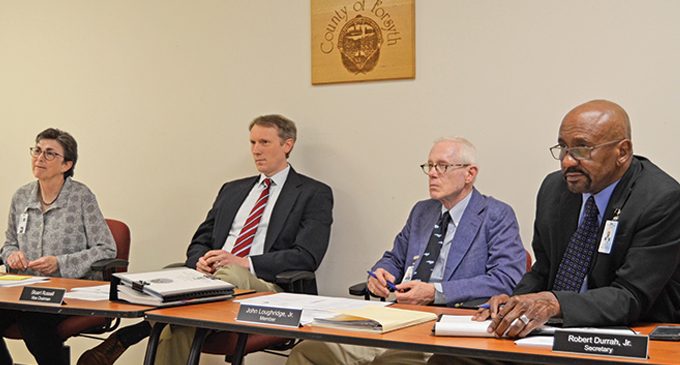Early voting discussion begins

Voters will see touch screen machines return for early voting, but the Forsyth County Board of Elections (BOE) has yet to determine when and where that will be.
The BOE plans to continue its early voting discussion on Monday, July 2, at 5 p.m. and must approve a plan by July 17. When it began early voting deliberations last Thursday, it was to a capacity crowd that had numerous suggestions for the board. There were several comments about the importance of Saturday voting for those who work during the weekdays. There were also those urging the BOE to use Winston-Salem State University, which had been an early voting site from 2000-2012 until a Republican majority BOE, chaired by Ken Raymond, stopped using it.
“I wanted to put in a bid for Winston-Salem State University, which also has easy access for students at Salem and UNCSA [UNC School of the Arts], plus all three faculties and staffs and nearby residents,” said Winston-Salem resident Anne Wilson.
WSSU was a source of contention in 2016 early voting when it wasn’t considered even after dozens of community members spoke in favor of its use. The board is now evenly split between political parties and has as its chairwoman Democrat Susan Campbell, who has WSSU among her proposed sites.
Two speakers voiced concerns about giving early voting preference to college students, saying they may only live inside the county while attending class but still vote on local issues. Beverly Lung of Walkertown also had a concern if the areas outside the city would be covered by early voting sites.
“Why do you have to have so many on top of each other, so to speak, as opposed to serving all your constituents throughout the whole county?” asked Lung, during the BOE’s Tuesday, June 26, meeting.
Traditionally, early voting sites are more numerous in the heavily populated city. Walkertown Library, which does traditionally have a site, didn’t make it into the list of sites BOE members expressed interest in as of last week.
BOE members had to deal with several variables before they could discuss sites.
“We have a snafu,” said Campbell as she opened the early voting discussion last week.
The “snafu” is Senate Bill 325, a bill that will overhaul early voting if it becomes law. The bill was vetoed yesterday by Gov. Roy Cooper, but that’s expected to be overridden by the Republican-controlled General Assembly this week.
The bill sets this year’s early voting for Wednesday, Oct. 17 through Friday, Nov. 2. This eliminates the possibility of early voting on the weekend before Election Day. All early voting sites must be open every weekday from 7 a.m.- 7 p.m. with optional weekend days. These extended hours drove the cost of every proposed plan with eight to 12 sites to well outside of the BOE’s early voting budget. With 12 -hours days being required by the potential law, the only cuts local BOEs can make is to either eliminate weekend voting days or reduce the amount of sites.
However, by the board’s Tuesday meeting, the situation had improved. BOE Director Tim Tsujii said the county had agreed to add $203,000 that was allocated in case of a second primary to the BOE’s existing $145,000 early voting budget for a total of $347,921. Tsujii told the board the estimated cost of having 12 sites with nine workers would be $326,110.
Another variable the board is waiting on is for the City’s Recreation and Parks department to get back to Tsujii on using its recreation centers. Tsujii plans to speak with someone in that department this week. Recreation centers the BOE are considering possibly using are Old Town, Miller Park, Sprague Street, Brown Douglas, Hanes Hosiery, Polo and South Fork.
Other sites being considered are the Anderson Center at WSSU, St. Paul United Methodist Church, Mazie Woodruff Center and the BOE office along with the Southside, Reynolda Manor, Kernersville, Lewisville, Clemmons and Rural Hall libraries.
The board did vote Tuesday to return to using touch-screen voting machines for early voting and paper ballots for Election Day. Rented AutoMark machines will be used for visually impaired voters. This is the result of the General Assembly passing an extension on its new requirements for a paper-based system that led to the use of paper ballots for early voting in the primary. The touch screen machines will save the BOE money that it takes to print ballots while giving it time to test new touch screen voting machines that produce paper ballots during this election, so they’ll be ready to use starting next year.











